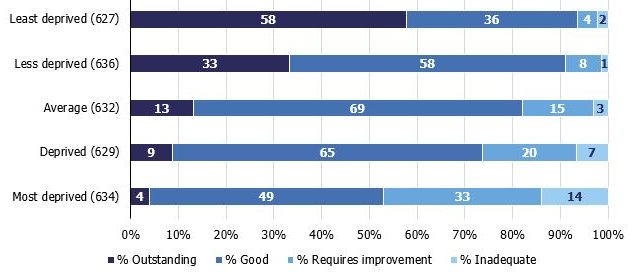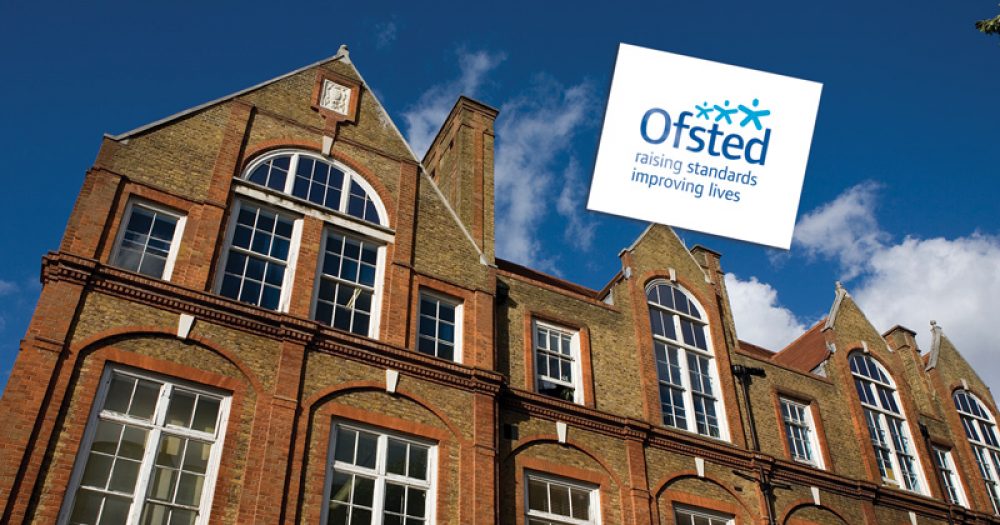Schools in the most affluent areas are more than twice as likely to be rated ‘outstanding’ by Ofsted as those in the most deprived.
New data reveals the extent to which schools with richer intakes outperform others, and the inspectorate is now under pressure to demonstrate that schools are judged on performance rather than on pupils’ backgrounds.
The data, released at the request of a group of headteachers, shows the proportion of schools that received each of the inspectorate’s four grades, broken down by pupil ethnicity and the proportion eligible for free school meals.
Just 16 per cent of schools in the most deprived areas are ‘outstanding’, compared with 37 per cent in the least deprived.
Similarly, whereas only five per cent of all schools in the most affluent areas are ‘requires improvement’ or ‘inadequate’, 21 per cent of schools in the most deprived areas are.
Pupil ethnicity also appears to have an impact on grades. For example, just four per cent of secondary schools in the most deprived areas with high proportions of white British pupils are rated ‘outstanding’ and 14 per cent are rated ‘inadequate’.
Of secondary schools in deprived areas with a large proportion of other ethnic groups, 29 per cent are ‘outstanding’ and just four per cent are ‘inadequate’.

Stephen Tierney (pictured), who chairs the Headteachers’ Roundtable, said the findings reveal that schools in deprived areas with high levels of white British pupils “are statistically stuffed”.
“Our question to Ofsted is: can they with any reliability, consistency and validity evaluate a school on its effectiveness, rather than its intake?” he asked.
Rather than spending millions of pounds on inspections, resources would be better spent on helping every school to improve.
“Ofsted needs to open up a whole debate about how we do school improvement,” he continued.
Many school leaders have long complained that the inspectorate does not give due consideration to the challenging circumstances in which different schools operate.

For instance, Ofsted’s stance that all schools must be measured “by the same standard” has been previously criticised by Ian Widdows, founder of the National Association of Secondary Moderns, for failing to fully take school context into account.
He has pointed to the fact 98 per cent of selective schools hold Ofsted’s top two grades, compared with just 79 per cent of non-selective secondary schools, and 69 per cent of secondary moderns (non-selective schools in highly selective areas).
Teachers have tweeted their dismay at the most recent graphs in Tierney’s blog.
Vic Goddard, the head of Passmores Academy in Essex, which works in a deprived area, said the revelations are “awful for recruitment and retention of staff in certain areas”.
Sean Harford, the inspectorate’s national director of education, said he would look into the graphs, but added he was not certain they were definitely official Ofsted material.
Ofsted is currently working on a new inspection framework, and there are rumours that the four grades could even be replaced with a pass/fail system. It was approached for comment.



Who polices OFSTED?
Almost every year OFSTED produce a new framework to terrorise the profession.
Once the new framework is released we get the “exposing OFSTED myths” story from them, where they list all the things that are not true about how OFSTED operated the year before. (The myths being the collected inspection experience of thousands of teachers across the country!)
Now we have some data (from OFSTED) showing how biased their own system is, we can expect push back from them because this undermines their very existence, and exposes that they have ruined the careers of many hard working headteachers for nothing.
So, who polices OFSTED? Time to #takebackcontrol
It’s actually quite simple. Ofsted is regulated by Parliament, so in effect is policed by the Government of the day, which in turn is democratically accountable to (aka policed by) the electorate. Sorry to burst the conspiracy bubble.
And guess what, there isn’t a profession anywhere that thinks the body that regulates them and holds them to account is a well run organisation that does a good job. Kinda goes with the turf.
#rightonslogan
Thanks Mark for clarifying that. Good to know that the government will be taking a look at these figures and holding OFSTED to account where necessary. You have reassured me that the Headteachers’ Roundtable group have nothing to worry about, and their figures are probably some sort of conspiracy by those who have devoted decades of their lives to the education of our young people.
I’m glad to have helped.
The relationship between disadvantage and results is complex. The OECD (2010*) found ALL pupils (advantaged and disadvantaged) tended to do worse than expected when in schools where the majority of pupils were socially-disadvantaged. Conversely, ALL pupils did better than expected when in schools with a ‘privileged socio-economic intake’.
The former are (obviously) more likely to be in deprived areas whereas the latter are more likely to be in affluent areas.
Ofsted judgements are influenced by results but neither inspectors nor politicians take the OECD finding into account when judging schools.
*Viewing the UK School System through the Prism of PISA https://www.oecd.org/pisa/46624007.pdf